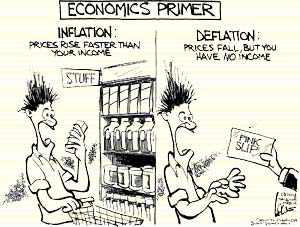You might be amazed to know that the generally used consumer price index (CPI) has over 75,000 different items used in it. Govt employees call around to different retail establishments and inquire as to how much something costs. They then compare that figure to what the same item used to cost. There's a number of problems with this.
In any given year 33% of the items that they used to measure are gone. When was the last time you bought a record player or a beanie baby? They then have to go and find the closest replacement to the missing item. As if all of that wasn't misguided enough they then have to account for the quality/longevity of an item. As a result the equation that calculates can get long and complex. As you can imagine it's not free of controversy either.
Here's an example. The first truck that I got when I was 16 is not nearly as high in quality than the truck I bought two years ago. I personally think it could last me twice as long and the warranty reflects that. However, it was 33% more in actual dollar amounts. So if I drive that vehicle for 200,000 miles instead of 100,000 vs the old vehicle. Over that mileage it would cost me half, but the newer vehicle costs 33% more. As a result there was actually deflation when it pertains to my vehicle, assuming all else constant.
Now what if somebody drove both of those cars for only two years with the same miles? That's right than they would have an inflationary transaction. A large one at that! Housing prices go up by 3% according to the govt. But I own my home and have a fixed rate mortgage or it's paid off. How does this impact me? Well to use myself as an example. If my insurance and property tax go up by 3% than I will pay an extra $144 this year. Compare this to how the CPI calculates it as $7,530 more for buying the same house. See how that doesn't even apply to me?
So while the govt tries to keep track of inflation for the entire economy, what you really need to look at is your Personal Price Index. How does inflation impact you as an individual? Sometimes it may be much higher if you're overly dependent upon medical care. It may be lower to non-existent if you buy little to nothing. The price of clothes drops dramatically if you go from shopping at Banana Republic to shopping at Goodwill. Gas, insurance, and car prices don't impact you at all if you ride your bike everywhere. See what I'm saying?
If you want to insure that inflation impacts you less, buy less! Create your own deflation...

 RSS Feed
RSS Feed
